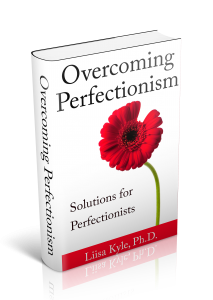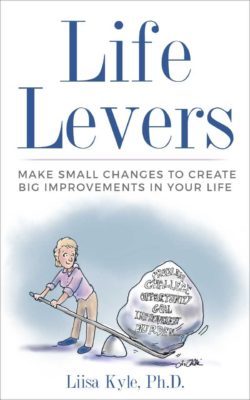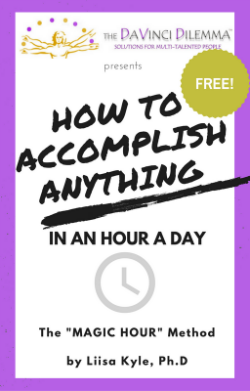
By Chris Potter (Flickr: 3D Judges Gavel) [CC BY 2.0 (https://creativecommons.org/licenses/by/2.0)], via Wikimedia Commons
In this age of social media, there has been a flaring up of vociferous online opinion-sharing. Have so-so service from a contractor? Chronicle your experience on Yelp and Angie’s List. Purchase a sub-par product? Warn others via Twitter, Facebook, and Amazon.
This is a particular danger for those of us inclined to be hard on ourselves (and/or others) — i.e. the perfectionists among us. From my work with perfectionists over the past twenty years, I’ve found that judgment anchors and propels every aspect of perfectionism. Perfectionists are constantly evaluating everyone and everything. We judge every person, place or thing we encounter. . . everything about your past, present or future . . . everything we imagine.
Now judgment has its place. Our ancestors developed judgment as a way of protecting their bodies from physical danger. As humans evolved, we developed judgment to protect and guide ourselves in social circumstances as well as to make decisions effectively. “Good judgment” is very useful indeed.
But perfectionists take judgment to extremes. Perfectionists compare everyone and everything to a perceived ideal — a ‘perfect’ version. For example, we believe there is a ‘correct’ way to do things or a single ‘right’ way for things to turn out.
Often, we make snap decisions based on our ideal and the expectations they imply, rather than being open to surprises. For example, we might be instantly dismissive of someone with little schooling when in fact they may have innovative ideas unfettered by formal education. We may pooh-pooh a helpful approach because it came from a source we don’t respect — a source that fails to rise to our ideal standard.
Worse, our hyper-judgment establishes an unavoidable gap between our expectations and reality. Any gap between our perceived ideal and what we experience is annoying, frustrating, disappointing and/or stressful. And the sad thing is: by definition our perceived ideal is unattainable so there is always a gap between our reality and what we wish to experience. We are sentencing ourselves to a self-made purgatory.
Consider the toll on yourself and others to be under constant assessment. Consider the enormous energy required and the tremendous strain and pressure that are generated by such steady scrutiny.
To disrupt your perfectionism, it is absolutely essential that you find ways to short-circuit your natural tendency to make frequent, involuntary judgments.
Recognize Judgment
This is probably the single most effective thing you can do to change the way you’ve been operating: To the extent you can train yourself to suspend judgment, to shift from automatically judging everyone and everything to merely observing them, you are well on your way to overcoming your perfectionism.
Step one in this process is to begin to notice when you are judging.
***
Helpful Daily Practice: Notice Your Own Judgments
The idea here is to train yourself to recognize when you are judging someone or something. Once you can recognize your judgment in the moment, you can take steps to address it.
***
Activity: Going forward, pay attention to the judgments you make in your daily life — especially snap judgments about people, places, things and activities. Some will be big and important — how you feel about your co-workers or yourself, for example. Many judgments will be more innocuous: Maybe grammatical errors on public signs irritate you. Perhaps you’re adept at finding flaws with restaurant meals.
Pretend it’s like a game and you get points every time you notice you’re making a judgmental thought. You earn bonus points when you notice in the moment. (It may sound hokey but — if you will suspend judgment and try it — rewarding yourself with points can be highly effective in facilitating personal changes).
Warning: this may be exhausting at first. Most perfectionists are staggered by the scope and frequency of their own judgments, once they start to pay attention to them. “I didn’t realize I was always, always judging every little thing I experience,” exclaimed Martine when she began the process. “I’m racking up lots and lots of points!”
***
Generate Alternative Interpretations
Consider that there are many other ways of viewing any situation. For example, if your knee-jerk thought is something like, “Wow, what an awful outfit Taylor is wearing” consider (a) Taylor is dressing the best she can, given her pocketbook and taste, (b) Taylor may be a fashion maven who is expressing herself in ways you’re not appreciating, (c) Taylor is so frazzled at work and home that she threw on whatever she had at hand and you’re lucky she remembered to don her pants at all, and/or (d) Taylor doesn’t care a hoot about how her outfit looks so why should you?
This is especially helpful when you are judging yourself. When my client Simone tried this technique, she found “Ugh! I messed up that presentation” quickly became (a) Well, that wasn’t the best I could do but it still was better than many people could do. (b) Maybe I can’t accurately assess the presentation’s true value because I can’t be objective. (c) Maybe the clients liked the presentation and were oblivious to the flaws I detected. (d) Maybe someone in the audience got something really important out of the talk so who am I to diss it? (e) This was a great opportunity for me to learn how to do a better presentation next time.
***
Key Tool: Generate (at least three) Alternative Interpretations
Going forward, whenever you notice yourself making a judgment, brainstorm a minimum of three other possible ways of re-framing your original assessment. Bonus points if you can make yourself laugh.
Again, this may be overwhelming at first as you grapple with all the judgment streaming in your head. However, once you begin the practice of generating alternative explanations, you will be able to train yourself to do so automatically. Then, when you catch yourself making a judgment, you will just as quickly counter with other options.
When practiced over time, this tool basically trains you to engage in fewer judgments. You’ll view yourself and others more charitably, which will feel so much better.
***
Activity: Practice generating alternative interpretations.
Go to a public area such as a coffee shop or shopping mall. Sit and watch people. As judgments pop into your head, generate at least three alternatives interpretations.
***
Suspend Judgment
The next level in addressing your judgment is to curtail it. You’ve done enough judging for one lifetime. Judging hurts you…and it’s no picnic for people around you. The less you judge, the better for you and the people around you.
Here’s the truth: This situation just ‘is’.
From your limited point of view, you have no accurate way of assessing if this situation is ‘good’ or ‘bad’ or ‘scary’ or anything else. What seems like a terrific opportunity at first blush might end up, in the long term, being the worst experience in your life. Something that appears to be a massive setback might in fact be a way for you to deepen relationships and devise a better solution that ends up yielding a far more successful project.
For example, let’s say a gallery says ‘yes’ to exhibiting your work. That seems ‘good’, right? Now imagine that there’s a fire in the gallery and a lot of work your work is lost. Now your exhibition seems ‘bad’, right? But wait — because of the fire, let’s say that you now get inspired to do the best series of your life, earning you a lot of press and new commissions…well then the original ill-fated exhibition seems ‘good’. But what if you can’t handle your new-found fame, or you get swindled by unscrupulous financial managers or…you get the idea.
Sometimes ‘dreams coming true’ are really nightmares. Sometimes ‘disappointments’ are really ‘blessings in disguise’.
All you know for sure is that this situation just ‘is’. To the extent you can suspend judgment, you can allow things to unfold without the added, unnecessary energy of whatever label you’ve applied.
***
Key Tool: Suspend Judgment
When you do notice yourself making a judgment, stop.
Avoid labeling what you are experiencing.
It’s not complicated. Simply cease judging everyone and everything. Rather than assessing, evaluating, and/or labeling, simply observe.
If you can’t suspend judgment, delay it. (“Well it seems ugly to me but let’s see what I think next month.”)
***
Activity: Practice suspending judgment.
Go to a public area such as a coffee shop or shopping mall. Sit and watch people. Simply observe. When judgments pop into your head, push them gently but firmly aside.
***
Activity: Practice withholding your opinion.
Going forward, whenever you feel compelled to give an opinion, pause. Is this really necessary? Is it a matter of life and death for me to utter my opinion at this moment in time? If not, don’t. Give yourself points every time you avoid giving your opinion.
***
Activity: Social media challenge.
Challenge yourself: How long can you go without posting a comment online that denotes any judgment or opinion?
***
Benefits of Suspending Judgment
Once you can suspend judgment — and once you can release your iron grip on your own opinion — you foster openness. This creates a space — a window — through which new ideas, people and possibilities can enter your life.
Going forward, pay attention to what happens as you suspend judgment. See what new opportunities arise, the more open you are. Keep notes on the new information and prospects you receive from unexpected places. See what you learn. Watch what happens with your personal and professional relationships. Chronicle the benefits as a way of reinforcing your shift away from judgment.
***
 For more, check out my book Overcoming Perfectionism: Solutions for Perfectionists available here in hardcover, paperback, and eBook formats: http://bit.ly/PerfectionismSolutions
For more, check out my book Overcoming Perfectionism: Solutions for Perfectionists available here in hardcover, paperback, and eBook formats: http://bit.ly/PerfectionismSolutions
***
Want to re-publish this article? Go for it – just include the author’s name, a link to this original post and the following text blurb:
Are you struggling with too many talents, skills, ideas? You may have The DaVinci Dilemma™! Find tools, fun quizzes, coaching, inspiration and solutions for multi-talented people at http://www.davincidilemma.com/ .




Great article, many thanks for that! I did notice a couple of typos 😉
Ha! You’re very welcome and quite funny, Henk. Perfectionists, unite!